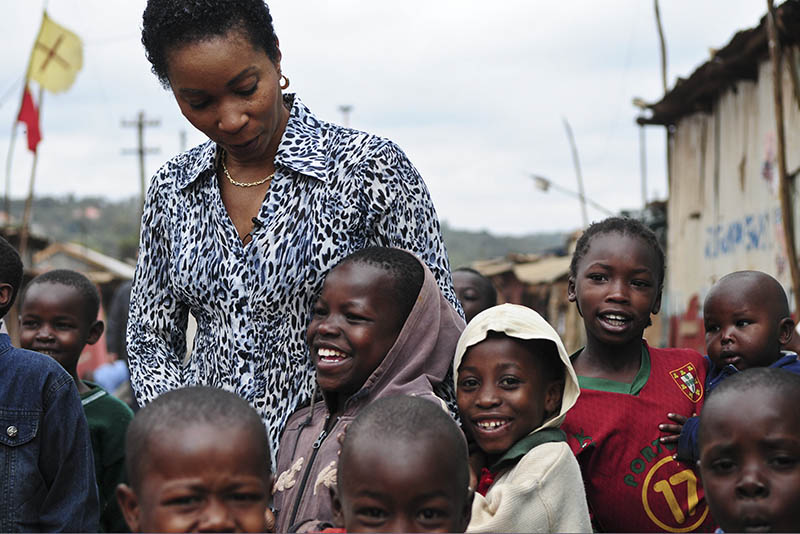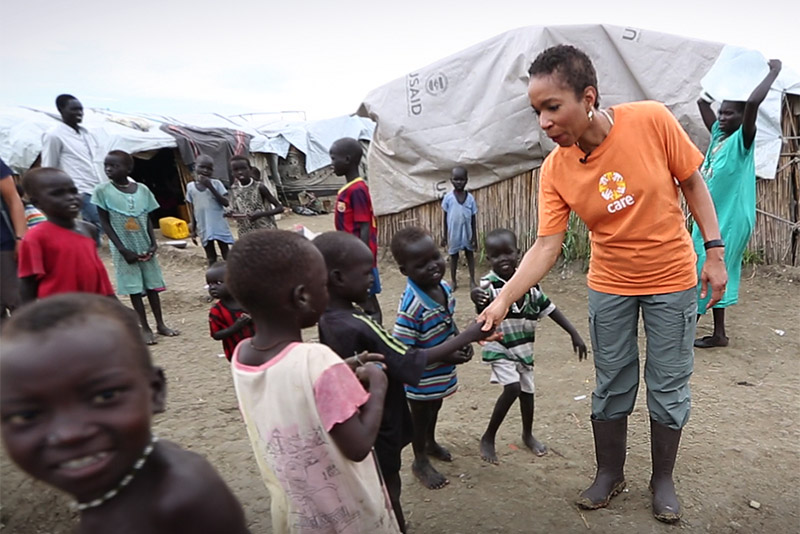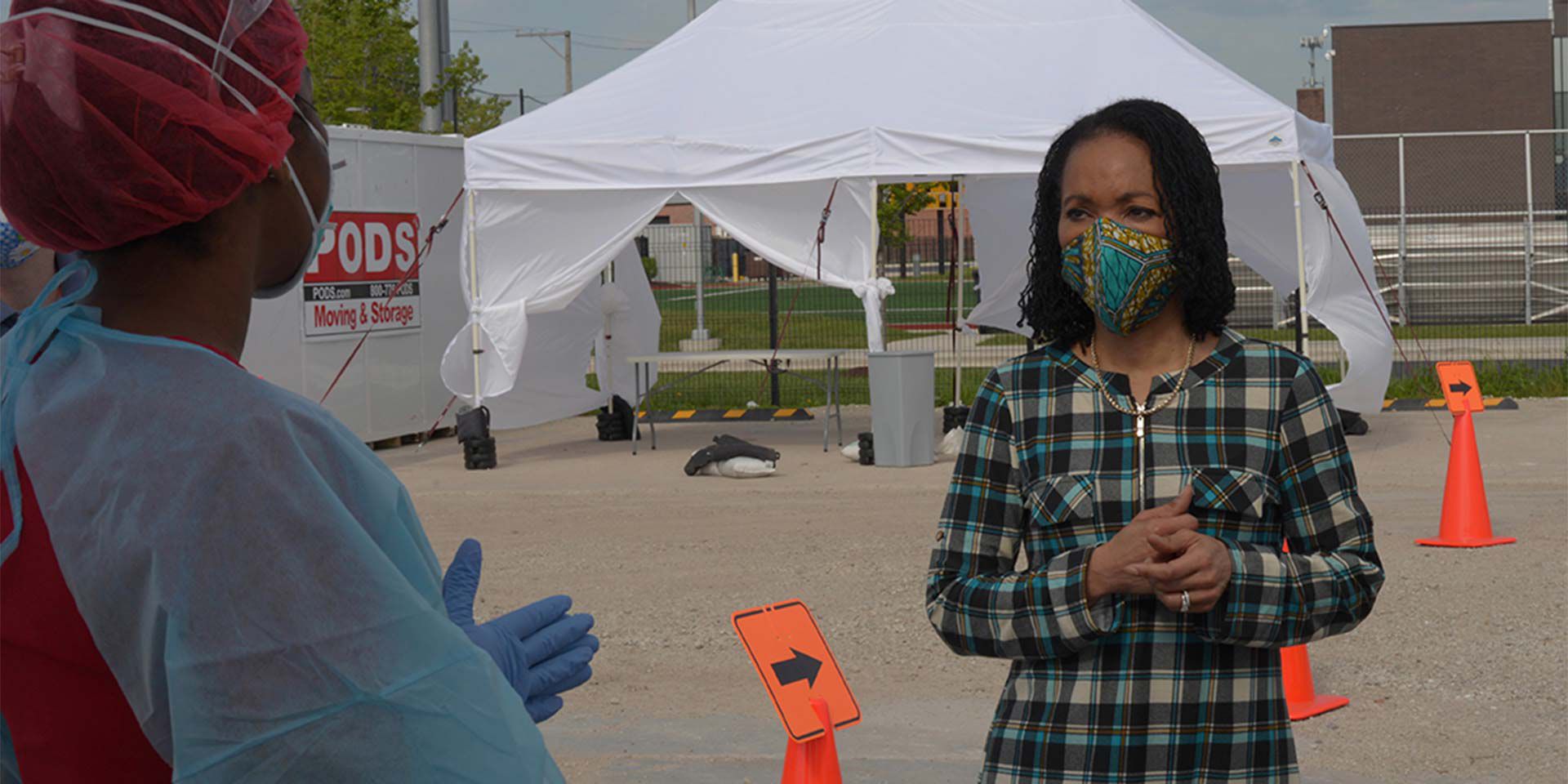Helene Gayle has been a leader in global development for more than three decades. She has helped direct the U.S. global response to fighting AIDS, helped shape global health policy while at the Bill & Melinda Gates Foundation, oversaw CARE’s global operations for a decade, and now leads the Chicago Community Trust. The death of George Floyd, and other recent killings of African-Americans by police, has shaken her deeply. The protests in the United States and around the world, which have been followed by substantive discussions on combatting racism in public forums and corporate boardrooms, have given her hope that this moment will usher in an era of real change. This interview has been edited for length and clarity.
Q: We are focusing this edition of IFC Insights around the topic of racism, and how it relates to global development. But I first want to know, on a personal level, how did the killing of George Floyd and the protests that have now become global affect you?
A: As a Black person in America, most of us have in some way or the other personally had experiences of racism. And I think for me there was something almost visceral about seeing somebody so callously murdered in front of our eyes, and calling for his mother and all of the incredible disregard for his life. That was portrayed over and over again, as we rewatched that video. I think, for me, something personally snapped. It was a moment where—while I have always felt that standing up against racism, and focusing on the injustices of Black people and people of color [is important]—you felt enough is enough.
It touched me very deeply. And the movement that has continued to evolve after that has been heartening...people saw this for what it was and wanted to take a stand. But also having seen movements come and go, I worry about whether we will have the moral courage to stand behind the words that came out from so many corners of business, of government, of nonprofit sectors, and around the world. Are we going to have the moral courage to actually stand up for the statements that were made in support of Black Lives Matter and in support of anti-racism?

Helene Gayle at Kibera slum in Nairobi in 2009. Photo: Allen Clinton
Q: How has this moment affected your work with the Chicago Community Trust?
A: About a year ago, we launched a strategy focused on closing the racial and ethnic wealth gap. We had already said that this issue of racial and economic inequity was going to be our highest organizational priority. COVID-19 and its disproportionate impact on African-American and Latino communities, as well as the George Floyd murder, highlighted why that strategy was perhaps more important and more relevant than ever.
Q: What did you learn from working in international development that's now useful working in Chicago, and vice versa, what have you learned from working in Chicago that the global development community can learn from?
A: One of the things that I always appreciated in in our work globally was how important it is to listen to communities, and to really work in partnership with the many communities. You know oftentimes in the United States, we don't do as good a job of trusting the wisdom of people who are there and rooted in their own communities. And I think that's something that we tend to do fairly well in the international development space. Maybe it’s because a lot of the international organizations recognize coming into somebody else's country, you've got to listen to them. And you've got to have a posture of understanding people where they are and what their needs are.
Another lesson was really the power of public-private partnerships. We do a lot of that in the global development world and recognize that there's a lot of synergy by looking at different sectors and what they bring to the roles. I brought that [perspective] into my work here in the U.S., where often we draw rigid boundaries between the nonprofit sector and the private sector.
In the global arena, we haven't struggled and tackled as much the issues of inequity within countries. Going back to the discussion about racism here in America, it was really heartening to see how the protests spread throughout the globe, and in countries that you would have been surprised that this really struck a nerve. When we talk about diversity on a global level, we often focus on gender diversity because we know that women have been so disproportionately left out of economic opportunity. But in most countries, there are underrepresented groups who are also marginalized and stigmatized and left out of economic opportunities. I hope this moment helps us to examine some of these same issues on a global basis.
Q: You mentioned earlier that you're hoping that there is now the moral courage to follow through on what has been expressed. What should private sector leaders learn from this moment? What would you like to see them do?
A: I think it's important for people to look top to bottom—[and ask] how their businesses can provide greater opportunity. Oftentimes, people first go to the issue of diversity. It’s important that we have more people of color on corporate boards and in management. Does the Board represent the populations that businesses serve? And if not, why not? And how can you make a difference? But I think stopping there means that you're not looking deeper at what you can do. Who do you use for your professional services? Do you use Black lawyers? Do you use Black financial managers? Do you bank with Black banks? Are there ways in which your suppliers could be more diverse and you could give more economic opportunity? Are you looking at your whole supply chain? There's a lot of ways in which businesses can think differently about how they use their resources to represent [people and] groups who have been left out.

Helene Gayle at the Protection of Civilians camp in South Sudan, 2014. Photo © Care/Raegan Hodge
Q: Are you hopeful that CEOs and management teams will do this?
A: I'm actually quite encouraged. For [both] of the boards that I sit on—Colgate Palmolive and Coca-Cola, as well as the companies that I work with here in Chicago—I do think that this was a wake-up call. I think that many corporations didn't appreciate the experiences of their Black employees. And I have been very impressed not only by the bold statements that have been made, but the fact that companies are looking at policies and practices, and are going to put together plans. Now, you know, plans are one thing and action is another, but we're hearing from people that they are going to take this seriously. I think people want to be on the right side of history for this issue. You know, I'm an eternal optimist. I really do feel like there's a different tenor, there's a different sense of commitment. And I think there's also going to be a different accountability. We're also hearing the same things from the investor community, and the investor community is what ultimately holds most corporations accountable. That bodes well.
I’ve never seen such bold statements coming from relatively conservative institutions talking about systemic racism. This was not even a term that people used. So I do think there is at least a greater reckoning and recognition of the problem. And I believe that recognition of a problem is the first stage to taking action.
Q: On your earlier point on representation, it's important for me to see someone like you, an African-American, leading in global development and now at the Chicago Community Trust. Why do you think African-Americans are so underrepresented in international development?
A: I think that seeing role models is important because you can't be what you don't see. So if you don't see role models, where people who look like you or where you feel like you're equally invited, I think that's one barrier. There's also the fact that for many Blacks and other underrepresented groups, we have so much work to do at home. Often people don't think about how important it is to get a global experience. But I think a global experience opens up your thinking about how you contribute back home. For many years in global development, I was often the only Black person in the room.
Q: You said you’re an optimist. Are there any last words of hope you’d like to leave us with?
A: People often ask the question that you asked: Why do you think this [moment] is any different? I think it can be different if we believe it can, and if we make it so. I think the power is in our hands, I think we can do it. I think we can make sure that this is not a forgotten moment.
Published in July 2020
